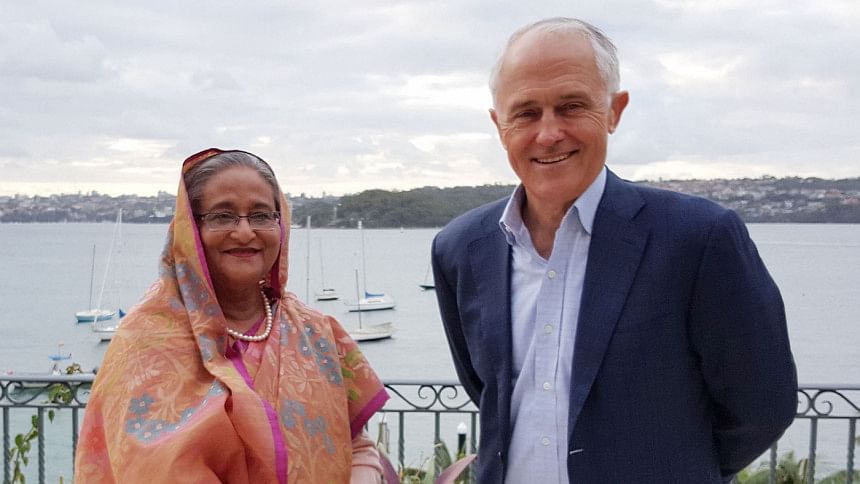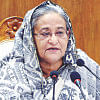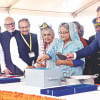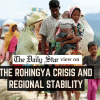Australia to help resolve Rohingya crisis

Australian Prime Minister Malcom Turnbull yesterday assured his Bangladeshi counterpart Sheikh Hasina of continuing support to Bangladesh for resolving the Rohingya crisis.
He gave the assurance at a meeting with Hasina at his Sydney residence, PM's press secretary Ihsanul Karim told reporters after the meeting.
Turnbull said his country would continue to put pressure on Myanmar for taking back Rohingyas.
Hasina informed Turnbull about her government's steps taken for sheltering Rohingyas and its future plans in this regard.
The two leaders discussed issues of bilateral trade and investment and agreed to find viable means to boost cooperation.
Turnbull accepted Hasina's invitation to visit Bangladesh, Ihsanul said, adding that the visit would take place at a mutually convenient time.
Foreign Minister AH Mahmood Ali was present at the meeting.
SUPPORT SOUGHT FOR ECONOMIC PROGRESS
Hasina yesterday sought cooperation from Australia on human resources as Bangladesh was going to the next stage of development through graduation from the group of Least Developed Country.
“As Bangladesh is going to the next stage of development through graduation from LDC, we need greater human capacity where Australia can contribute by providing training-type programmes and vocational education,” she said.
While visiting Western Sydney University, the premier also sought Australia's cooperation in developing an inclusive and people-centric blue economy.
Hasina sought technical assistance for developing Bangladesh's marine aquaculture and exchanging teachers on oceanography.
She called upon Bangladeshi students at the university to take advantage of the best knowledge that the institution could offer.
She said she was deeply touched at the establishment of a bust of Father of the Nation Bangabandhu Sheikh Mujibur Rahman on the Sydney university campus. “The bust is rightly located in front of the Institute of Ocean Governance to recognise Bangabandhu's vision and pioneering role on maritime boundary demarcation through an act of parliament in 1974.”
She mentioned that Bangladesh has been enjoying warm relations with Australia since it recognised the country on January 31, 1972. “Very fundamental of bilateral relations between Bangladesh and Australia originates from the fact that Australia was the first country from the developed world to recognise our independence.”
Hasina recalled that after the declaration of independence by the Father of the Nation on March 26, 1971, he called upon the people of Bangladesh to fight for independence.
“We offer homage to the world leaders who stood by our side during our Liberation War and the early years of our nationhood. Amongst the world leaders who championed our cause for liberation is Edward Gough Whitlam. Whitlam played a leading role in building a bipartisan consensus about Bangladesh as the leader of the opposition in the Australian federal parliament in 1971,” she said.
Hasina mentioned that Whitlam played an important role in lobbying with the international community for Bangladesh to be recognised by the Commonwealth and other countries.
“Edward Whitlam visited Bangladesh on January19, 1975. It was the first and last visit [to date] by a prime minister of Australia to Bangladesh.”
She also recalled with gratitude the contribution of Australian national William AS Ouderland during the Liberation War for which he was given gallantry award “Bir Protik” and awarded with “Friends of Bangladesh War of Liberation”.
The premier said Australia has been a favourite destination for higher studies for Bangladeshi students and some 200 students are now studying in Western Sydney University.
“Western Sydney University's present collaboration with Bangladesh is strengthening capacity of our judiciary management and providing training programme for Department of Oceanography, University of Dhaka and Bangabandhu Sheikh Mujibur Rahman Maritime University to enhance their knowledge and skills in ocean governance.
“The students who are here shouldn't only obtain degrees, rather they have many things to learn,” she said.
Mentioning that her government solved maritime boundary disputes with two neighbouring countries, Hasina said Bangladesh has to utilise its maritime resources, which can contribute to its economic development.
The PM paid homage to Father of the Nation Bangabandhu Sheikh Mujibur Rahman placing a wreath at the Bust of Bangabandhu on the University campus. The bust was unveiled by Law Minister Anisul Huq in February last year.
Leaders and activists of Australia Awami League greeted the PM with a bouquet there.
'WORK ON 2021-2041 DEV PLAN UNDERWAY'
Sheikh Hasina yesterday said her government has started the work to formulate a 2021-2041 development plan to make Bangladesh a developed and prosperous country by 2041.
The PM was addressing a civic reception in Sydney yesterday. The Australian chapter of Awami League organised the event titled “Civic Reception of Sheikh Hasina” at Sofitel Sydney Wentworth hotel.
Hasina said her government always formulates long-term plans for the country, but the BNP government used to take plans on “adhoc basis”.
She urged Bangladeshi expatriates to uphold the country's image abroad. “Wherever you stay you must have the special attention so that Bangladesh is regarded with dignity.”
The PM also asked them to remain alert so that anti-liberation forces cannot come to power anymore.
Mentioning that the government is now setting up 100 special economic zones in the country, she said her government created a huge investment scope for expatriates.
Sheikh Shamimul Haque, president of Bangabandhu Council, Australia, presided over the programme.
RMIT UNIVERSITY TEAM MEETS HASINA
A delegation of RMIT University, Melbourne met Hasina at her hotel suite in Sydney yesterday.
The delegation, led by Prof Geoffrey Strokes, deputy pro vice-chancellor of the university, shared the unreleased report of a study conducted over remittances flow to Bangladesh and the way of better use of the remittances to improve economic, social and civic outcomes.
Prof Supriya Singh, Prof Shadat Khan and Prof Graham Airey of RMIT University and Prof Quamrul Alam of Central Queens University were present.

 For all latest news, follow The Daily Star's Google News channel.
For all latest news, follow The Daily Star's Google News channel. 








Comments